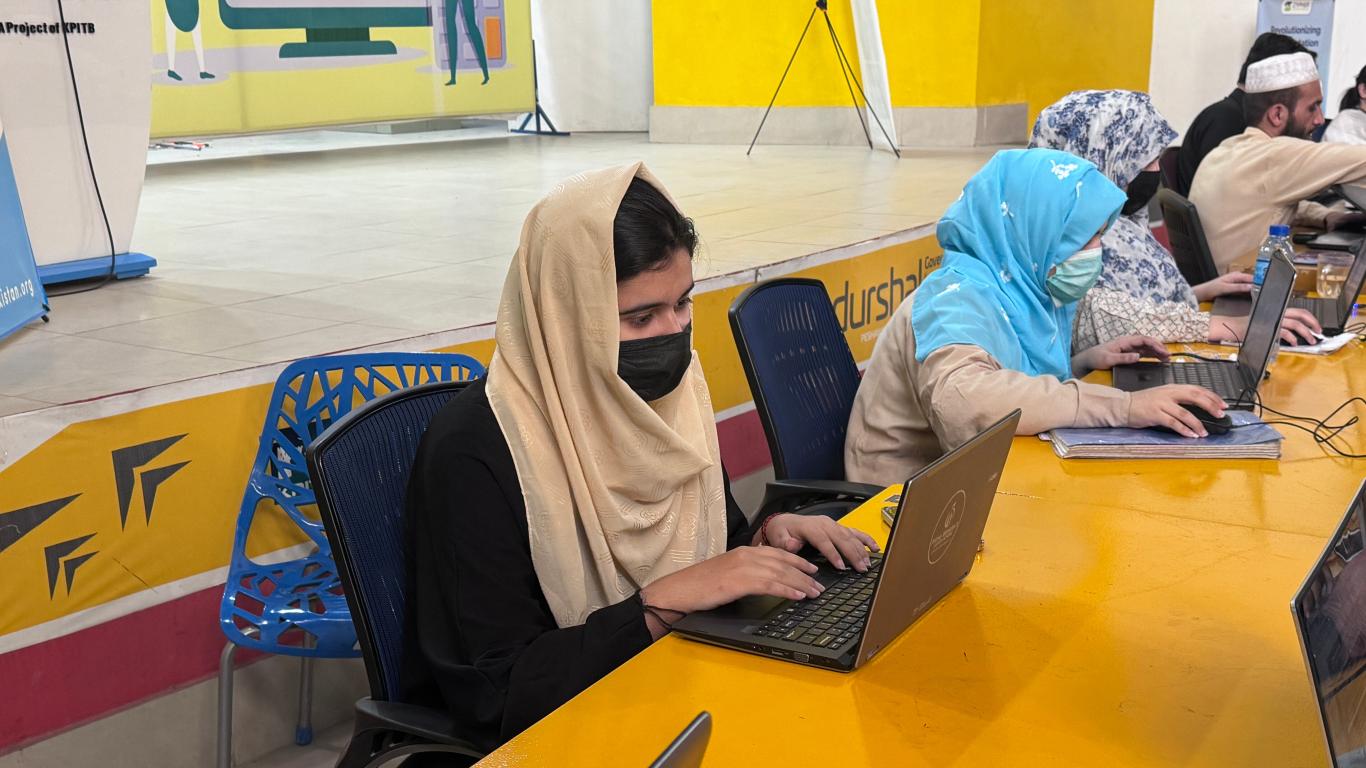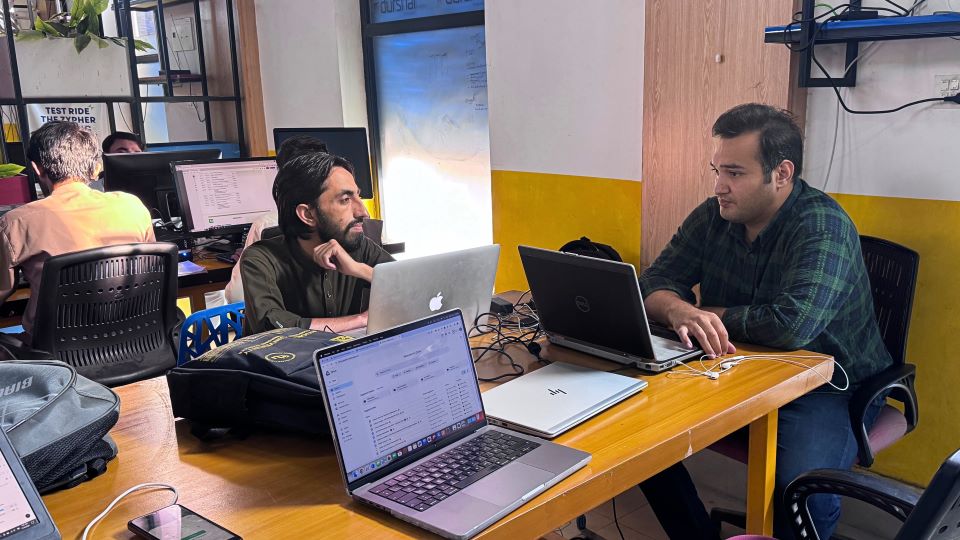
Welcome to the Generation of Creators, Makers, and Doers series, where we introduce our current cohort of passionate change-makers and alumni of the KP Government Innovation Fellowship. Since 2014, Code for Pakistan and the KP IT Board have collaborated on this program, driving meaningful change in public service delivery across KP.
The Fellowship Program unites individuals who combine their expertise as engaged citizens and skilled technologists. This powerful blend enables our Fellows to tackle pressing community challenges, with the potential to positively impact thousands of lives in KP.
This year, our Fellows are working on a unique challenge: developing a Large Language Model to handle government-related queries. This model will streamline answers on topics like Rules of Business, Procurement, Recruitment, Service Matters, and will provide summaries, presentations, notes, and service-related information. The goal is to make government processes more accessible, allowing both citizens and government employees to quickly access crucial information.

Let's hear from our Director of Fellowships, Ibraheem Saleem, and Fellows of Cohort # 8 Tabinda Qudrat and Zaland Afridi.
What inspired you to apply for the KP Civic Fellowship?
Ibraheem Saleem, Director of Fellowships: Seeing the impact this program has made over the years is what drives me to expand and strengthen it. Every cycle brings new energy and passion from Fellows who genuinely care about their communities. I wanted to lead this effort to equip young minds with tools to make civic impact in KP, knowing that this isn't just professional growth for them—it's personal.
Fellow, Tabinda Qudrat, Data Scientist: I grew up in Bannu, a city rich in tradition and home to strong, resilient people. With my background in data science, I've always wanted to apply my skills to make a real impact in KP, where access to tech resources remains limited. As an alumna of the KP Women Civic Digital Internship, I've already seen this impact firsthand and previously worked alongside fellows on government tech projects. Now, as part of the 8th cohort, I'm thrilled to drive this change rather than just support it. KP is my home, and the fellowship is one of the most meaningful ways I can contribute my skills to help its people. Inspired by this mission, I've moved to Peshawar, staying in a hostel, and am fully committed to giving back to the community!
Fellow, Zaland Afridi, Software Engineer: Growing up in a remote village and seeing firsthand the limitations in public service delivery in KP, I realized the need for innovative, tech-driven solutions. As a software engineer specializing in AI, I'm passionate about using technology to transform public services and improve efficiency in government operations. The KP Innovation Fellowship offers the perfect platform to bridge this gap, allowing me to apply my skills to meaningful challenges and drive positive change. With the support of experienced mentors and a network of changemakers, I'm eager to make a lasting impact for my community and government.
What drives you to work on community projects?
Ibraheem: Our vision for the Fellowship is to create leaders who carry the same passion we at CfP have for community-driven solutions. Community work isn't just a duty—it's a way to see real, positive change. I'm motivated by watching Fellows like Tabinda and Zaland grow as they address issues that matter deeply to the people of KP.
Tabinda: The people of KP are my inspiration—especially the women who don't have access to the same opportunities. I come from a family that values education, and I'm fortunate that my father supported my career choice in tech. But for many women, these opportunities aren't available. Through this fellowship, and previously as an alumnus of Code for Pakistan's KP Women Civic Digital Internship, I'm committed to showing other women in KP that they, too can enter the workforce and contribute to their communities.
Zaland: What drives me to work on community projects is the desire to make life easier by addressing essential needs. Growing up, I saw firsthand the gaps in public services, and I believe technology especially AI can bridge these gaps between government and citizens. With the fellowship, I'm excited to develop tools like an AI Chatbot for public service delivery, a Pest Detection App, and a Fake News Detection Tool. Each project is a step toward empowering communities with accessible, impactful solutions. It's rewarding to use technology as a catalyst for meaningful change, creating tools that make a real difference in people's lives.
Why is it important to improve services and resources in your community?
Ibraheem: Access to quality public services is a basic right of all citizens. By empowering Fellows to build practical solutions, we're addressing community needs while setting a benchmark for other regions. It's crucial for KP's growth, and I believe that each project we complete brings us one step closer to a more inclusive, connected province.
Tabinda: I am currently working on the Government GPT—a generative AI-based app and website designed to assist users with their queries related to government processes and policies. This tool will serve both government employees and citizens. For instance, if you need information on obtaining a driving license or the process for acquiring a birth certificate, this platform will guide you. Similar to ChatGPT, but specific to KP, the Government GPT will address citizens' concerns wherever government involvement is needed. It will be trained and optimized with government data, allowing users to input their questions and receive accurate, relevant responses.
Zaland: Improving community services is about creating lasting change and unlocking KP's true potential. Our region is filled with talent, yet often lacks essential resources. With tools like an AI Chatbot to streamline public access to government information, Pest Disease Detection for farmers to protect crops, and a Fake News Detection tool to combat misinformation, we can make a tangible difference. Through this fellowship, I'm committed to giving back by building accessible, impactful tools for future generations. It's not just about addressing today's needs, it's about building a smarter, stronger, and more informed KP.
What are you most excited to learn during your Fellowship?
Ibraheem: I'm always learning alongside the Fellows—how to listen better, how to adapt our projects to serve communities more effectively. The collective energy of the Fellows excites me. I look forward to seeing how each one of them grows over the course of the program and how we, as a team, navigate the challenges of civic tech.
Tabinda: In the past, I focused on a single aspect—machine learning. But through the fellowship, I've come to understand the importance of collaboration. Now, I sit with my cohort and government departments, learning about the steps leading up to my role and how my work fits into a larger picture. I get to witness, in real-time, how what I'm building becomes a solution that citizens will actually benefit from. I'm especially excited to learn how to engage end-users in the development process. So much of our work is about building relationships, understanding needs, and testing our solutions with the people who will use them. I'm also incredibly grateful for the mentorship from past Fellows. The fellowship is truly a community of innovators, and I'm inspired by the culture of collaboration and support here.
Zaland: I'm most excited to learn how to transform ideas into practical, impactful solutions that address real challenges in KP. This fellowship offers a unique chance to work closely with government departments, where I can gain firsthand insight into public service needs and operations. I'm eager to sharpen my technical skills, especially in developing AI-driven tools, and learn how to design technology that directly improves people's lives. The guidance from experienced mentors and collaboration with passionate fellows will be invaluable, and I can't wait to turn this learning into sustainable solutions for my community.